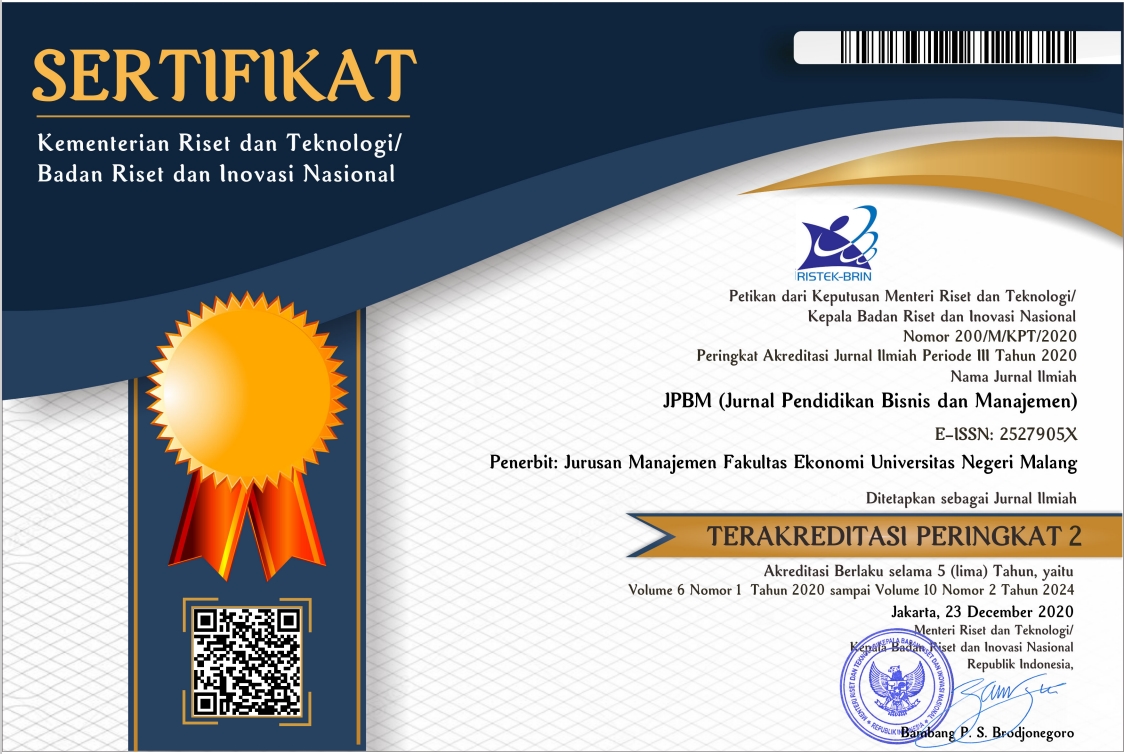Effect of Entrepreneurship Education and Self Efficacy Towards The Intention of Entrepreneurship
Abstract
This study aims to know the influence of entrepreneurship education and self efficacy toward student’s intention of entrepreneurial. The population in this study was 140 students of grade XII marketing and accounting for Islamic Vocational High School with a sample of 104 students. The method of data collection in this study used questionnaires and documentation. This research is a quantitative study, using descriptive analysis, multiple linear regression analysis, and classic assumption tests which include normality, multicollinearity, and heteroscedasticity tests. Based on the result, entrepreneurship education and self efficacy show a significant influence on student’s intention of entrepreneurial at SMK Islam Batu.
Keywords
Full Text:
PDFReferences
Adnyana, I., & Purnami, N. 2016. Effect of Entrepreneurship Education, Self Efficacy and Locus of Control on Entrepreneurial Intention. E-Jurnal Manajemen Unud, 5(2), 1160-1188.
Ajzen, I. 1988. Attitude, Personality, and Behavior. Milton Keynes: Open University Press.
Anggraeni, D. A., & Nurcaya, I. 2016. The role of self-efficacy in mediating the influence of entrepreneurship education on entrepreneurial intentions. E-Jurnal Manajemen Unud, 5, (4), 2424-2453
Bukirom, I. H., Permana, A., & Martono. 2014. The Effect of Entrepreneurship Education and Entrepreneurial Motivation on the Establishment of Student Entrepreneurial Souls. Media Economics and Management, 29(2), 144-151.
Hartini, A., 2002. Analysis of the Relationship Between Employee Commitment, Climate Organization and Performance of Employee Work, Case Study of Corporate & Unit Division of Network PT Telkom Indonesia, Tbk. JREM, 25 - 33.
Kasmir. 2011. Bank and other Financial Institutions. Editions of Revision 11. Jakarta: Rajawali Pers.
Küttim, M., Kallaste, M., Venesaar, U., Kiis, A., 2014. Entrepreneurship Education at University Level and Students’ Entrepreneurial Intentions. Procedia - Social and Behavioral Sciences, The 2nd International Scientific conference, Contemporary Issues in Business, Management and Education 2013. 110, 658–668. https://doi.org/10.1016/j.sbspro.2013.12.910
Saroni, M. 2012. Managing Journal of School Education. Jogjakarta: ArRuzz Media. (Indonesian Origin)
Setiawan, J.L. 2014. Examining Entrepreneurial Self-efficacy among Students. Procedia - Social and Behavioral Sciences, The 5th Indonesia International Conference on Innovation, Entrepreneurship, and Small Business (IICIES 2013) 115, 235–242. https://doi.org/10.1016/j.sbspro.2014.02.431
Suryana. 2013. Entrepreneurship Tips and Process Towards Success. Jakarta: Salemba Empat.
Vemmy, C. 2012. Factors that influence the entrepreneurial intentions of SMK students. Jurnal Pendidikan Vokasi, 2(1), 117-125. https://doi.org/10.21831/jpv.v2i1.1022.
Welsh, D.H.B., Tullar, W.L., Nemati, H., 2016. Entrepreneurship education: Process, method, or both? Journal of Innovation & Knowledge 1, 125–132. https://doi.org/10.1016/j.jik.2016.01.005
Wedayanti, N.P & Giantari, I.G. 2016. Peran Pendidikan Kewirausahaan Dalam Memediasi Pengaruh Norma Subyektif Terhadap Niat Berwirausaha. E-Jurnal Manajemen Unud, 5(1), 533 – 560.
Wijaya, T. 2007. Relationship between Adversity Intelligence and Entrepreneurial Intention (Empirical Study in Yogyakarta 7 Vocational High School Students). Jurnal Manajemen Dan Kewirausahaan, 9(2), 117-127
DOI: http://dx.doi.org/10.17977/um003v4i32018p142
Refbacks
- There are currently no refbacks.
JPBM (Jurnal Pendidikan dan Bisnis Manajemen) is licensed under a Creative Commons Attribution-NonCommercial-ShareAlike 4.0 International License.
JPBM (Jurnal Pendidikan dan Bisnis Manajemen) is abstracted and indexed in :
















